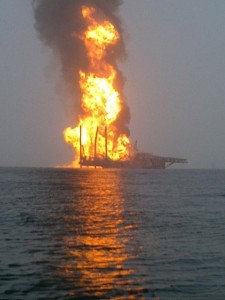The people of Nembe Kingdom in Bayelsa State have asked the management of Shell Petroleum Development Company (SPDC) to stop the gas flaring in their area as the act causes environmental damage to their community.
 Chairman, Oil and Gas Committee of Nembe Kingdom, Comrade Nengi James Eriworio, recently led the over 300 aggrieved women and youths of the community to shut down SPDC’s oil installations in the area.
Chairman, Oil and Gas Committee of Nembe Kingdom, Comrade Nengi James Eriworio, recently led the over 300 aggrieved women and youths of the community to shut down SPDC’s oil installations in the area.
“We demand that SPDC stop and put to a halt to any further flaring of gas along the Nembe creeks and its environs for the protection of our life and the property is our exclusive preserve,” Eriworio said.
Gas flaring entails burning off the natural gas associated with the crude oil during extraction in places where there is no capacity or infrastructure to trap and make use of the gas. It is a process by which unusable or excess natural gas is released by a pressure valve and burned – releasing tonnes of carbon dioxide (Co2) into the atmosphere and contributing to the global warming – and thus the climate change – scourge. .
In the 1960s and 1970s, natural gas used to be continually flared in Texas, US and Saudi Arabia. But, in more recent years, Russia and Nigeria flare the highest amount of natural gas.
 Flaring natural gas has pumped out about 110 million metric tonnes of carbon dioxide to the atmosphere each year, representing about 0.5 percent of the world’s Co2 emissions. The act of gas flaring has reduced due to the potential energy use/commercialisation of associated gas, and has led more oil extracting companies to devise means to trap and channel the gas for energy. Gas flaring has also reduced due to more awareness of the significant health and environmental effects it produces as well as the fact that the emitted Co2 is a major driver of climate change.
Flaring natural gas has pumped out about 110 million metric tonnes of carbon dioxide to the atmosphere each year, representing about 0.5 percent of the world’s Co2 emissions. The act of gas flaring has reduced due to the potential energy use/commercialisation of associated gas, and has led more oil extracting companies to devise means to trap and channel the gas for energy. Gas flaring has also reduced due to more awareness of the significant health and environmental effects it produces as well as the fact that the emitted Co2 is a major driver of climate change.
But this has not been the case in Nigeria, where government has controversially been lenient with oil producing firms, who are notorious for being reluctant to put in place machinery to trap and channel the gas for energy production and thus curb the act. In Nigeria, flaring associated gas has been illegal since 1984 and the Nigerian government has set up several deadlines to end the practice, but the act continues till this day The much-publicised 2012 flare-out deadline has, once again, been shifted.
Eriworio, a human rights activist and presently chairman of Civil Liberties Organisation (CLO) in Bayelsa State, listed the reasons for the Nembe youth’s shutting down of SPDC installations to include: brazen undermining of the supreme traditional stool of Nembe Kingdom, inadequacy of development and unjust marginalisation of Nembe people, as well as and lack of social amenities in the kingdom.
He said the women and youths of the communities voluntarily participated in the shutting down of the facilities as, according to him, the Nembe people have immensely contributed to oil production in the country.
Eriworio also accused SPDC of polluting the ecosystem in the area, saying that over four spills had occurred in the area due to the activities of SPDC. He claimed that the company had never participated in the cleaning up of the spills caused by its facilities.
“We resist attempts by anybody and SPDC to divide us, Shell should not use any divide-and-rule system to rule Nembe community.
“We also demand for 60 percent of all contracts from SPDC or the company should pack out from the Kingdom,” he demanded.
Nembe lamented that communities making up the Nembe Kingdom produce over 120,000 barrels of crude daily, but that the communities do not have a single staff with the company and lacks constant electricity.
By Oyins Egrenbido
